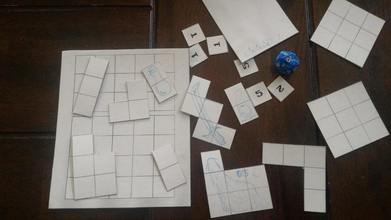|
I put up a new, very short, story over here. Go over and have a read. In fact, go over and read any of the other ones too and let me know what you think.
0 Comments
Best Games - River Raid
The first thing you notice about River Raid is how beautiful it looks. Symmetric fields of solid color in perfectly balanced palettes. Everything on screen is clear and crisp. The second thing you notice is how smooth everything moves. The Atari 2600 is well known for its low resolution and chunky movement, but River Raid feels fluidly analog at all times. Next you notice the sound. In a world of digital farts and squawks somehow only the most harmonious tones were selected from the white noise generator built into the Atari 2600. River Raid sounds intense, but never jarring. When you start to play the game, the ramp from simple shooting gallery to incredibly demanding is so smooth you won’t notice that the game is getting harder until you crash 3 times in span of a few seconds. Instantly you restart and try again, becoming incrementally better at the game with each attempt. There is no end to River Raid. No point where the game informs you of your mastery. It grows more difficult until it over taxes either your skills or your stamina. You can’t beat it, you can only improve. It would be easy to suggest that this purity of design and presentation sprung from the limitations of the Atari 2600. Somehow I doubt that. Carol Shaw surpassed most of the perceived limitations of that simple computer in River Raid. She created a smooth, vibrant, aesthetically pleasing game on a system not really known for that sort of thing. The game explains itself while you play with no need for instructions or tutorials. It is abstract while being easily readable. River Raid could only exist as an interactive computer program. The engineering and the art only work when meshed together as one. It is a self contained wonderful thing polished to a high shine. River Raid isn’t a product of limitations. River Raid is proof that we never really saw what the Atari 2600 was capable of, or more to the point, what a brilliant creator could accomplish with those simple tools. River Raid by Carol Shaw is one of the Best Games There is no way that I will ever play all of these games. It will never happen.
There was a brief window in the 80’s and maybe the early 90’s that a ‘gamer’ could have at least touched most of the popular titles and genres. I have played a Megaman, and I have played a Romance of the Three Kingdoms. I have played Street Fighter, and Doom, and Space Quest. Action, strategy, sports, adventure, role playing, puzzle, narrative, abstract, simulation, educational. All the types, styles, and genres available, I played. There were games that I liked better than others, and game types that had their devoted fans, but there weren’t subcultures. There was no punk rock or Jazz. No surrealist theater or period piece costume dramas. Gamers played games, and most likely they played all of them. I’m not a psychologist or cultural anthropologist, but I think that this unifying of all people who play video games as ‘gamers’ has caused us no small amount of problems. Ownership is a strong feeling. When people feel a sense of ownership over something they work on or create it can be very positive. We work harder and strive further when we feel like the thing we are working on represents some aspect of ourselves. Pride and accomplishment tied to our own sense of wellbeing and self worth can be beneficial or detrimental, but there is no denying it is powerful. So what happens when you tie that feeling of ownership and sense of self worth to something that is out of your direct control? Something you are a fan of. The actors and creative team of the most recent Star Wars movies probably have a few things to say about it. People who have attached part of their identity to their love of this sweeping space fantasy story can either be the warmest, most generous friend you haven’t met, or the most bitter, jilted stalker you didn’t know existed. It probably wouldn’t be very long before you would feel very guarded against one, the other, or both. It isn’t because these fans love Star Wars, it’s because they feel they own Star Wars. They have dedicated themselves to minding the gate of what is and is not Star Wars to protect that part of themselves they have attached to it. This either sucks or is wonderful for the people involved in creating Star Wars, but that intense fandom doesn’t wash over into other movies. The same people angry at, or praising Star Wars don’t redirect their focus at Remains of the Day. There are no Kazuo Ishiguro fans screaming boycott when Never Let Me Go abandoned historical fiction to slum it in Sci-fi. The punk rockers don’t storm in and kick over the symphony orchestra brass section because they are a tool of The Man. Movies, books, music, television, are all too broad and deep to see fans of one thing to drift over to attack creators and fans in another. Gaming hasn’t been like that at all. For at least the first few decades, people who played video games were ‘gamers’ and that sense of identification and ownership spanned an entire art form. The results are pretty tragic. The game industry is often singled out for its visible and invisible toxicity. Gamers attacking and harassing one another. Gamers attacking and harassing game creators. Gamers attacking women and marginalized groups for specific and sustained harassment. Gamers quite probably fostering the rise of alt right and exclusionist, isolationist sentiment. ‘Gamers’ on balance, have been pretty fucking hideous. There is no way that I will ever play all of these games. It will never happen. It’s not only me. There is no way that any person will ever play all of these games. There is no way that any person, no matter how dedicated to the artform of video games will ever even know about all of the games available. You can like and play video games, but there are subgenres, and subcultures, that you will never know about or engage with. People who feel othered can and will find groups that gather around the same types of games. People who have no interest in industry dramas will make friends and have fun in games you or I will never play. People with no interest in new trends or genre fads will play popular games, because their friends suggested them. People will play games in the way that they watch movies and read books. They will like what they like, sometimes well and sometimes poorly, but they won’t stray far from those types of games. They will find what they enjoy and uncover new games as the feeling strikes them. The artform has grown too broad for people who enjoy it to be called ‘Gamers’. Losing that title is one step toward disentangling this wonderful artform from the sense of ownership that eats at everything we loved about it in the first place. You know how they say “for every movie made there are 100 scripts on the shelf”? Games are the same. I took one of my game ideas off the shelf recently. It had started as a video game riff on everyone's least favorite game mechanic, inventory management, but I have made some significant changes. Most notably, I’ve changed it into a board game.
The original intent for this game was for it to be a mobile or tablet, single player game that demanded fast reactions and decisions. Of course that sort of thing is not the strength of board games. Board games are slower, more contemplative, and usually turn based. The best board games are very communication focused. Creating an excuse for people to talk around a table is where board games shine. With that in mind, I had one of those shower thought moments where it occurred to me that Adventure Caddie could become a cooperative multiplayer game. Then I figured out how it would work turn based. After that it became a matter of putting it together to test it. I made some simple board and piece graphics in a vector program, printed them out, and glued them down to some cereal boxes. It’s a really quick way to make usable board game prototypes and I highly recommend it. Then I started playing parts of it to see what worked and what didn’t. I was lucky that I had written quite a lot of documentation about the rules and mechanics of the video game version, so a lot of the toughest problems had already been solved. I had spreadsheets with different in game items, characters, and enemies already filled out. I started going through all of it and tuning everything to the slower board game pace. Currently I have it working, but the numbers are all way off. The game isn’t balanced. It is far too easy to get caught in a loop of failure or success. It plays, but I don’t think that people would want to keep playing once they sense the ultimate outcome of all of their item moving and die rolling might have come down to one move early in the game. Like I said, it’s not balanced. I have been going through my spreadsheets and tuning up the numbers and then copying them on to little cardboard squares. I hope to have it ready for some larger scale playtests soon to work out even more of the kinks. After that… who knows. Maybe I make it a print and play on my site, try to sell a few copies, or both. No matter what happens, it feels good to get one idea off the shelf and made real. Dozens more to go. |
Archives
February 2024
Categories |
Owen McManus


 RSS Feed
RSS Feed